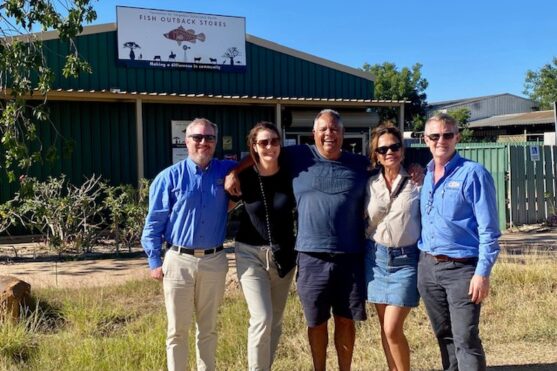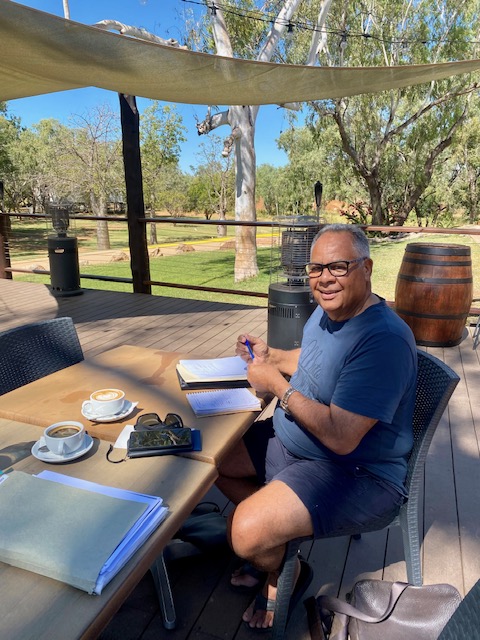‘You know what you’re doing’: Kim Collard was key to Kimberly recovery fund

In early 2023, Western Australia’s Kimberley region was battered by ex-tropical Cyclone Ellie, with damage to property and infrastructure isolating already vulnerable communities. Here, we learn the story behind how the Fremantle Foundation and Kim Collard’s Bibbulmun Fund worked with local community leaders to ensure support made it to the right people and places.
Perth Indigenous leader Kim had worked on plenty of projects in his time in philanthropy, but even he was shocked by the impact of the cyclone and flooding.
The Fitzroy River had reached its highest levels on record, peaking at 14.23 metres at Fitzroy Crossing on 4 January 2023, isolating the town and nearby communities. More than 200 people were evacuated from areas throughout the Fitzroy Valley. The Great Northern Highway Bridge at Fitzroy Crossing was damaged beyond repair and road transport had to be rerouted, while a barge and low-level floodway solutions were implemented.
“The Fitzroy River was so flooded that the volume of water in the region was 10 times that of Sydney harbour – that gives an indication of how significant it was,” Kim said.

Kim, a Balladong/Whadjuk man of the Noongar Nation, established The Bibbulmun Fund in 2013. The fund is the not-for-profit arm of his businesses Kulbardi Pty Ltd and Kooya, which are both designed to give back to the Aboriginal community across Australia. The fund is held in trust by the Fremantle Foundation.
Stu MacLeod is the CEO of the Fremantle Foundation, which was formed in 2010. The Foundation manages $6.2 million in donated funds, and represents donors and projects throughout Western Australia. The foundation launched the WA Relief and Recovery Fund in 2020 with an initial focus on pandemic support.
Sue Stepatschuk, then with the Fremantle Foundation, identified the need in the flood-affected communities. Using funds provided by a philanthropic organisation, Sue reached out to Kim as a partner to channel the funds and help identify the best granting opportunities.
Sue and Kim travelled the 2370km from Perth to the Kimberley region in May to visit the flood-affected communities. They also met local leaders to identify projects and understand where money was needed.
“Kim’s connections meant we were able to set up phone calls to be invited on to Country and to know who to meet,” Stu said. “They spent three days understanding the lay of the land and what the community wanted.
“The projects were community-led and the consultation was done in person, with respect, and with the understanding that the community would be leading decisions. It was interesting that none of the projects we ended up supporting had been on our radar from our research in Perth – the understanding on the ground is so different to what you find online.”
Kim said it was heartening that philanthropic organisation recognised the value of The Bibbulmun Fund’s cultural connections and grassroots approach.
“They said, ‘You know what you’re doing, let’s not reinvent the wheel’,” Kim said. “We visited three communities, spoke with key leaders and the heads of organisations. They said they needed trailers, mini excavators and bobcats. The money for that side of things was in their hands within days.”

Now, in the time since the cyclone, The Bibbulmun Fund is continuing to work with the communities on recovery and resilience-building. Some funds are still to be distributed, while other projects have included:
- $90,000 for the Foundation for indigenous Sustainable Health to buy an all-terrain caravan for staff quarters and mobile office
- $65,000 to the jobs and training organisation Yanunijarra Aboriginal Corporation for new and replacement equipment
- $90,000 to the Central Kimberley Football League to reactivate the popular competition
- $90,000 to Gurama Yani U to support pathways to sustainable employment and capability building.
Funds also went towards one of the most significant healing events, the 2023 Yajilarra Festival, which prioritised reconnection with kin and rebuilding. The festival was held over two days in July 2023 in sports grounds in Fitzroy Crossing, as the floods had washed away the sand banks at Danggu (Geikie Gorge) National Park that staged the inaugural event in 2021.
An evaluation report written by Dr Kathryn Thorburn included quotes from some of the performers, including the Bunuba Wiyi Choir, which comprises mainly descendants of Stolen Generation Bunuba people.
“After we sang last night, we were all on high, none of us could sleep, we all sat up and looked at the stars, thanking our ancestors, grateful for everything that has happened,” one choir member said.
Kim‘s enduring commitment to Aboriginal communities has been recognised with a number of significant awards this year. In April, the Bibbulmun Fund and WA Relief and Recovery Fund/Fremantle Foundation received the Philanthropy Australia First Nations Philanthropy Award, and in June, Kim was named West Australian of the Year – Aboriginal Award. He is also a finalist in 2024’s National NAIDOC Awards in the Male Elder category.
He said he is grateful for the awards and hope they shine a light on the fact that only 0.5% of charitable funding goes into Aboriginal projects in Australia.
“I want to spend the rest of my life increasing that bucket of money,” Kim said. “And ultimately, I want The Bibbulmun Fund to be managed, funded and distributed by Aboriginal people for Aboriginal people.”